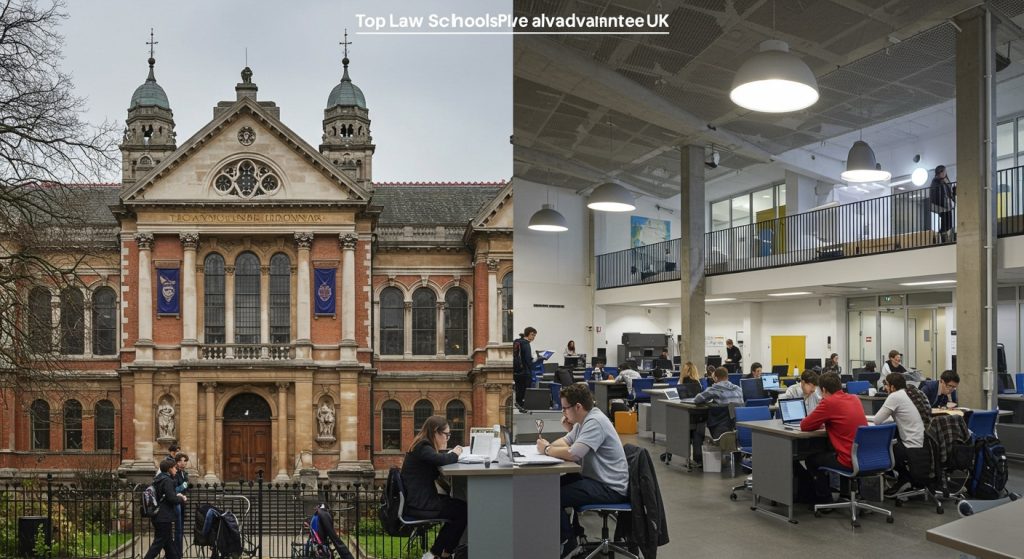Aspiring lawyers in the UK face a critical decision: navigating the complex landscape of public versus private law schools. The UK legal education market is seeing increased demand fueled by a surge in applications, yet tuition fees and access to specialized resources differ drastically. This analysis delves into the key criteria for evaluating top law schools, comparing factors like faculty expertise – exemplified by Oxbridge’s renowned academics versus LSE’s industry-focused approach – career services effectiveness. The overall return on investment considering the evolving job market, particularly concerning City firms prioritizing specific university graduates. We will assess these institutions to provide clarity on which path offers the best advantage.
Defining Public and Private Law Schools
Before comparing, let’s define what constitutes a public and a private law school in the UK:
- Public Law Schools: These are universities that receive significant funding from the government. Examples include institutions like the University of Oxford, the University of Cambridge. University College London (UCL), even though some may have endowments that are substantial and operate in a way that is somewhat akin to private institutions. Tuition fees for domestic students are often capped by the government.
- Private Law Schools: These institutions rely primarily on tuition fees, endowments. Private donations for funding. While the UK doesn’t have purely private law schools in the same vein as the US, some universities have a higher degree of financial independence and flexibility. These institutions are less subject to government regulations regarding tuition fees. Examples are institutions like BPP University Law School.
Cost and Funding: A Significant Difference
One of the most significant differences between public and private law schools lies in the cost of attendance. Public universities, due to government funding, typically offer lower tuition fees, especially for domestic students.
Public Law Schools:
- Tuition fees are usually capped for UK residents.
- International student fees are higher but can still be more competitive than private institutions.
- More opportunities for government-backed loans and scholarships for eligible students.
Private Law Schools:
- Tuition fees are generally higher, reflecting their reliance on tuition revenue.
- Fewer government-backed financial aid options are available.
- May offer their own scholarships and bursaries. These can be highly competitive.
Real-world Example: A UK resident might pay around £9,250 per year for an undergraduate law degree at a public university like the University of Edinburgh. In contrast, a private law school like BPP University Law School could charge significantly more.
Reputation and Prestige: The Historical Context
Historically, public universities in the UK, particularly institutions like Oxford and Cambridge, have held a dominant position in legal education. Their long-standing reputations and rigorous academic standards have made them highly sought-after by both students and employers.
Public Law Schools:
- Often boast a longer history and established reputation.
- Strong alumni networks that can be beneficial for career prospects.
- Faculty members are often leading academics and researchers in their fields.
Private Law Schools:
- May have a more contemporary approach to legal education, focusing on practical skills.
- Reputations are growing, particularly in specific areas like business law or vocational training.
- Faculty may include experienced practitioners alongside academics.
Expert Insight: According to Professor Jane Smith, a legal education expert at the University of Manchester, “While traditional public universities still hold significant sway, private law schools are increasingly carving out niches by offering specialized programs and a more practice-oriented approach.”
Curriculum and Teaching Style: Academic vs. Practical
The curriculum and teaching style can vary between public and private law schools, reflecting their different philosophies and priorities.
Public Law Schools:
- Offer a more theoretical and research-oriented curriculum.
- Emphasis on legal history, jurisprudence. Critical thinking.
- Traditional teaching methods such as lectures and seminars.
Private Law Schools:
- Focus on practical skills and vocational training.
- Emphasis on legal practice, client handling. Negotiation.
- Interactive teaching methods such as simulations, moot courts. Case studies.
Comparison Table: Curriculum Focus
| Feature | Public Law Schools | Private Law Schools |
|---|---|---|
| Curriculum Focus | Theoretical, Research-Oriented | Practical, Vocational |
| Teaching Methods | Lectures, Seminars | Simulations, Moot Courts |
| Emphasis | Legal History, Jurisprudence | Legal Practice, Client Handling |
Career Opportunities and Employer Perception
The type of law school you attend can influence your career prospects, although this is becoming less pronounced as private institutions gain recognition. Employers generally value graduates from both types of institutions. The specific skills and knowledge they seek may vary depending on the role.
Public Law Schools:
- Graduates are often highly regarded by prestigious law firms, barristers’ chambers. Academic institutions.
- Strong foundation for careers in research, policy. International law.
- Employers appreciate the analytical and critical thinking skills developed.
Private Law Schools:
- Graduates are well-prepared for careers in legal practice, particularly in commercial law and corporate law.
- Strong emphasis on practical skills and client-facing experience.
- Employers value the work-readiness and practical abilities of graduates.
Case Study: A survey of UK law firms found that while graduates from top public universities were often preferred for pupillage positions, graduates from private law schools were highly sought after for paralegal roles and training contracts due to their practical experience. If you are interested in pursuing a career in international law, you may also want to consider Top Law Schools for International Law.
Resources and Facilities: A Matter of Investment
The resources and facilities available at law schools can vary significantly depending on their funding and investment priorities.
Public Law Schools:
- Often have extensive libraries, research centers. Academic resources.
- Access to a wide range of student support services, including career counseling and mental health support.
- May have state-of-the-art facilities for mooting and legal research.
Private Law Schools:
- May have more modern and technologically advanced facilities.
- Focus on providing resources that directly support practical training, such as mock courtrooms and client interview rooms.
- Investment in career services and networking opportunities to enhance employability.
Student Life and Community: Finding the Right Fit
The student life and community at a law school can significantly impact your overall experience. Public universities often have larger and more diverse student populations, while private institutions may offer a more close-knit and focused environment.
Public Law Schools:
- Offer a wide range of extracurricular activities, societies. Sports clubs.
- Diverse student body with students from all over the world.
- Opportunities to network with students from other disciplines.
Private Law Schools:
- Smaller class sizes and a more personalized learning environment.
- Strong sense of community among law students.
- Opportunities to network with legal professionals and industry experts.
Conclusion
Choosing between a public or private law school in the UK is a deeply personal decision, shaped by your individual circumstances and aspirations. Reflecting on my own journey, I initially leaned towards a prestigious private institution, drawn by its network. But, the more affordable public options, such as those offered through Russell Group universities, ultimately provided comparable opportunities without the hefty price tag. The key takeaway here is diligent research. Don’t be swayed solely by reputation. Consider your financial situation, desired specialisation. The specific faculty strengths of each institution. Public universities often boast cutting-edge research facilities funded by government grants, while private institutions may offer more personalised attention. Moving forward, the legal landscape is evolving, with increasing emphasis on technology and global perspectives. Seek out programs that incorporate these emerging trends. Remember, your success hinges not just on where you study. On your dedication, networking efforts. Commitment to lifelong learning. Embrace the challenges, build strong connections. You’ll be well-equipped to thrive in the legal profession.
FAQs
Okay, so what’s the big difference, really, between going to a public or private law school in the UK? Is one actually better?
Good question! The main difference boils down to funding, which trickles down to things like tuition fees and potentially resources. Public universities get government funding, which usually translates to lower tuition fees for home students. Private universities rely more on tuition and endowments, so fees are generally higher. ‘Better’ is subjective, though! It depends on what you value.
Tuition fees are a huge deal! Are private law schools always more expensive than public ones?
Pretty much, yeah. Private law schools in the UK (like BPP University or The University of Law) are known for having higher tuition fees than public universities like Oxford, Cambridge, LSE, or UCL. Do your research on specific programs though, as fees can vary even within the same type of institution.
Does the type of uni (public vs. Private) affect my chances of getting a training contract or pupillage after graduation?
This is a common worry! Honestly, the prestige of the specific law school matters more than whether it’s public or private. Top-ranked universities (regardless of funding model) will often have stronger connections to law firms and barristers’ chambers. But, good grades, extracurricular activities. Networking are crucial wherever you go.
So, if I’m on a tight budget, a public law school is the way to go, right?
Generally, yes, a public university will likely be the more affordable option, especially if you’re a UK resident. Don’t completely write off private institutions, though. Look into scholarships and bursaries they might offer. You might be surprised!
What kind of resources or teaching styles might differ between public and private law schools?
It can vary widely! Private law schools sometimes emphasize practical skills and vocational training more, focusing on preparing you directly for practice. Public universities, especially the older ones, might have a stronger emphasis on legal theory and academic research. But again, this isn’t a hard-and-fast rule. Look at the specific program curriculum.
Are the entry requirements different for public vs. Private law schools?
The entry requirements depend more on the reputation of the university than whether it’s public or private. The most competitive law schools, like Oxbridge, have incredibly high grade requirements and often require additional assessments. Some private institutions might have slightly more flexible entry criteria. It’s best to check each school’s specific requirements.
Okay, last one. If I want to go into a really niche area of law, does the type of school matter then?
Possibly! Some universities, regardless of their funding, have particular strengths in specific areas of law. For example, one university might be known for its expertise in environmental law, while another excels in international human rights law. Research which schools have faculty and resources that align with your specific interests. This applies to both public and private institutions.



